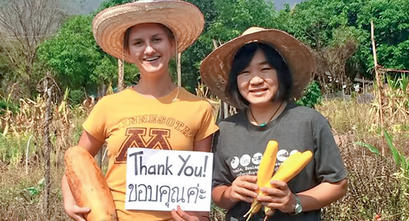
Acquiring Business Skills in Thailand
Monday, December 11, 2017
Most students say that their most transformative experience in school was in an international studies program. To emphasize this importance, the Carlson School was one of the first to make an international experience a requirement.
There are many ways to fulfill this requirement, including taking part in the Minnesota Studies in International Development (MSID) program offered through the U’s Learning Abroad Center. MSID brings students together with people from Africa, Asia, and Latin America to examine local and global problems with a particular emphasis on development issues.
Catlyn Christie is a double major in public/nonprofit management and HRIR with a minor in sustainability studies, concentrating on food systems. Her goal is to be an innovator within the public sector and devise creative solutions that address the systemic, root causes of issues.
She chose the MSID Thailand program for her international experience. For the first six weeks, she attended classes taught by Thai professors and went on field trips to various organizations and NGOs devoted to environmental sustainability, public health, and social services.
“The second half of the program was the internship phase, where we worked with an organization that matched our interests,” Christie says. “I spent my six weeks in a rural agricultural village an hour south of Chiang Mai, where I enjoyed staying with a family who taught me all about the lifestyle and operations of organic farming.”
Christie says it’s one thing to read about the rural agricultural villages of Thailand in a textbook, but it’s an entirely different experience to get to know and work alongside the individual farmers themselves. “I got a taste of what it’s like to be an organic farmer in the 21st century in Thailand, which is an experience that will resonate for a lifetime,” she says. She might not have had this experience without receiving a $3,000 Freshman Study Abroad scholarship.
“The scholarship was a key factor in determining what sort of program I could afford, short-term versus full-semester,” she says. “While both have incredible benefits, I am eternally grateful to have had a full five months in Thailand to adapt to the culture, learn about a wide range of complex issues, and build strong relationships with locals and my host family.”
Christie can quickly rattle off her career skills that have been enhanced through this program— intercultural competency, adaptability, problem solving, etc. “However, the greater takeaway for me is a newfound awareness and prioritization of listening and participation,” she says. “This program has taught me how to think critically about complex issues and always strive to elevate the voices of all impacted stakeholders, not just the loudest.”
She says that, as a leader, one must develop solutions to appease a variety of problems and pressures. “However, without involving those most impacted in the process of developing a solution, it stands little chance of being implemented and achieving its goal,” she says, adding that prioritizing inclusion in problem solving can develop solutions that people are excited to implement. “In all my future career endeavors, I intend to be a champion of this approach to making improvements,” she says.
A Force for Transformation
Students entering the workforce need to bring with them real-world experiences, time spent beyond the classroom applying their intellectual capacities in a hands-on way. Today’s business environment demands it. Experiential learning programs bring critical thinking skills to bear while solving real problems for real businesses and education abroad programs develop student competencies, all while working cross-culturally.
